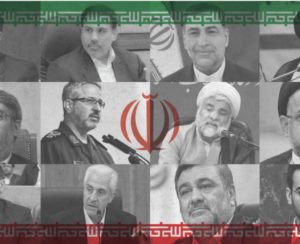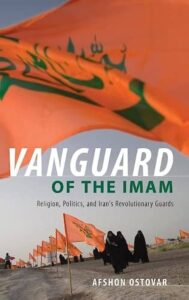
Credit: FDD
The government has announced plans to sanction Iranian officials behind what it called hostile activities in the UK, The BBC reports:
The foreign secretary said since January 2022 there had been 15 credible threats by Iran’s regime to kill or kidnap Britons or UK-based people. Under existing legislation, the UK can sanction Iranians for human rights violations or nuclear proliferation activities within the Islamic republic.
The UK will not “tolerate this malign behaviour”, James Cleverly said.
Meanwhile, Iran’s elite Revolutionary Guards are mobilizing the soft power of culture to advance the sharp power of Islamist ideology.
In The Financial Times, Tehran-based Najmeh Bozorgmehr reports on a lavish performance of The Seven Quests of Esfandiyar, in which the eponymous hero is presented as a role model for modern Iranians: a patriot who struggles with and triumphs over an evil enemy:
The force, which was established after Iran’s 1979 revolution to protect the Islamic republic from domestic and foreign threats, has long pushed to influence minds through the arts as well as the gun. Its cultural arm, Owj Arts and Media Organization, has pumped out thousands of documentaries, movies, television shows and songs promoting Islamic ideology. But this show had a different focus — nationalism, as well as religion.
 The Revolutionary Guards are the biggest obstacle to regime change in Iran, according to Afshon Ostovar, an associate professor of national security affairs at the Naval Postgraduate School and the author of Vanguard of the Imam: Religion, Politics, and Iran’s Revolutionary Guards. Their activities also reflect the regime’s identity crisis, he writes for Foreign Policy.
The Revolutionary Guards are the biggest obstacle to regime change in Iran, according to Afshon Ostovar, an associate professor of national security affairs at the Naval Postgraduate School and the author of Vanguard of the Imam: Religion, Politics, and Iran’s Revolutionary Guards. Their activities also reflect the regime’s identity crisis, he writes for Foreign Policy.
According to Emanuele Ottolenghi, a senior fellow at the Foundation for Defense of Democracies, Iran is actively seeking alliances in opposition to U.S. sanctions and aims to promote a vision of a multipolar world where U.S. influence is eroded in favor of rising authoritarian powers such as Russia and China, VOA reports.
“Where rising ascendant powers like China and Russia want to challenge U.S. dominance in trade and commerce … this competition has created this open space for other aspiring authoritarian regimes like Iran to step into the fray,” Ottolenghi told VOA.







